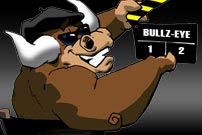 With the temperature dropping, it's time to find someone to keep you warm. Find your hookups with our online dating guide!
With the temperature dropping, it's time to find someone to keep you warm. Find your hookups with our online dating guide!
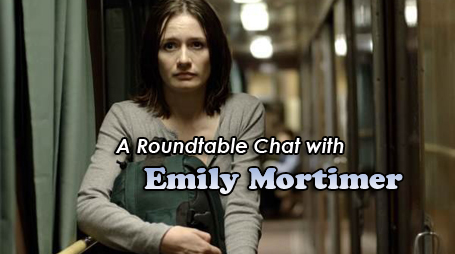
Interview date: 06/26/2008
Run date: 07/25/2008
Movies Home / Entertainment Channel / Bullz-Eye Home
Since breaking through in 2001 with smart indie dramedy "Lovely & Amazing," English actress Emily Mortimer has proven adept wielding an assassin's gun alongside Samuel L. Jackson in "The 51st State," portraying the fragile-boned girlfriend of Alec Baldwin's Jack Donaghy on "30 Rock," and making sweet custard-laden love with Ewan McGregor in "Young Adam." Mortimer moves to center stage with Brad Anderson's "Transsiberian," playing chief protagonist Jessie in this chilly thriller about murder and moral ambiguity. She spoke about last-minute casting, freezing temperatures and fake feet during a recent roundtable that Bullz-Eye attended.
Bullz-Eye: You got this part two days before the film began shooting, right?
Emily Mortimer: Mmm hmm.
BE: So can you talk about preparing for such a complex, multi-faceted role with basically 48 hours notice?
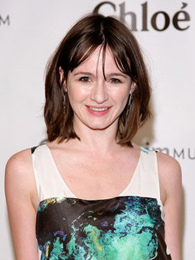 EM: (Laughter) It was pretty harried, I have to say. It was, just by necessity, something I had to literally just throw myself into and not think too much about. And in some ways I think that served me kind of well, because all I could do was use my own resources. I couldn’t try to hope to sort of find out what it might be like to be a Midwestern housewife who’s had some time in the jail in Memphis. I think, in the end, that might have been distracting, because, really, my job was, I guess, to access within myself some part of me that understands the pull between trying to sort of present your best face to the world and do the right thing and live in the correct way…and then the other pull, which I think is in all of us, and in some of us more than others, is just a sort of fascination with adventure and danger, and the sort of dark side, and that feeling of kind of hiding something for somebody that you love very much, which is something that we can all access, too. I think secrets are big part of all our lives, and we don’t really own up to it very often. All those things, even though what the character might do in the course of a film might seem unfamiliar, and I certainly haven’t bashed someone over the head… (Laughs) …but I felt there was a lot that there was a lot that I could draw on from my own experiences, just being alive in the world.
EM: (Laughter) It was pretty harried, I have to say. It was, just by necessity, something I had to literally just throw myself into and not think too much about. And in some ways I think that served me kind of well, because all I could do was use my own resources. I couldn’t try to hope to sort of find out what it might be like to be a Midwestern housewife who’s had some time in the jail in Memphis. I think, in the end, that might have been distracting, because, really, my job was, I guess, to access within myself some part of me that understands the pull between trying to sort of present your best face to the world and do the right thing and live in the correct way…and then the other pull, which I think is in all of us, and in some of us more than others, is just a sort of fascination with adventure and danger, and the sort of dark side, and that feeling of kind of hiding something for somebody that you love very much, which is something that we can all access, too. I think secrets are big part of all our lives, and we don’t really own up to it very often. All those things, even though what the character might do in the course of a film might seem unfamiliar, and I certainly haven’t bashed someone over the head… (Laughs) …but I felt there was a lot that there was a lot that I could draw on from my own experiences, just being alive in the world.
Reporter: I just want to know: what was Woody like as a husband?
EM: He was a fantastic husband! He was the best company, the best companion to have on a job like this, because we were very far away from home, and very dislocated and in the middle of nowhere, and he has a talent of making everything seem like an adventure. And it was almost fun and almost easy. He’s a great actor that makes the business of acting not at all fussy. It’s not sort of…there is nothing problematic about the way he approaches his work. It’s just a great ride being with him, so I got a huge kick out of working with Woody.
R: Samantha Morton was originally cast in your role. Do you know Samantha at all?
EM: Not really, no.
R: And how is that, replacing somebody at the last minute? It must feel weird, in that it was someone else’s role and then you’re taking over.
EM: Well, it happens more than you might think in films. And films…up until the day that you start shooting, nothing is for certain, ever. People drop in and drop out of films at the last minute all the time, and it’s kind of an accepted part of movie-making. And money drops in and drops out and suddenly…most of the time you think you’re doing a film, and in two days time it falls apart. It hasn’t happened to me before, where I thought I wasn’t doing a film and suddenly I was, but it’s so ephemeral, the business of getting a film together. So it doesn’t feel bizarre or strange or that unusual to have suddenly…I mean, I’ve had it happen to me before where actors who are supposed to be in a movie with me drop out at the last minute because they get a better job. So there’s kind of an understanding in the business that that’s how it works. I think we’re all very…you have to get your head around all sorts of circumstances all the time and be very flexible in the way you think about how a project is going to end up. No one knows how it’s going to end up until it’s ended up! You’re all sort of this teeming mass of ants kind of busying about this ant hill, and no one knows the shape of it, including the person who’s directed it or written it or is producing it or whatever. And then, finally, at the very end you all watch it and you suddenly understand what it was. So it wasn’t such a strange thing as it might seem from the outside.
R: I was very curious about culture clashes, with filming in Lithuania and China as well. Was it a case or art imitating life?
EM: Well, it was interesting for me because I thought I was going to have no problem with the culture clash, because I spent a lot of time in Russia, and I studied Russian at University, and speak it, and have always managed to sort of charm Ukrainian taxi drivers in New York by suddenly swearing in Russia in the back of the cab. I’ve got on with people as a result and impressed them, and generally people think it’s quite cool! And yet I found when I got into Lithuania…I was really looking forward to it, that I would be able to practice my little phrases and curse in Russian and they’d all think I’m cool, because it’s their second language. And it was going down like a cup of cold sick. No one seemed to be that psyched or charmed that I was talking Russian to them. They remained in a poker face. Then someone pointed out about a week into it that in Lithuania they’d been brutally oppressed and persecuted by the Soviet Union for 30 years, and the least cool thing to do in Lithuania is to speak Russian. (Laughs) And I feared I was getting unpopular. So I thought I was going to be the mediator, and I ended up making things much worse half the time! But it was a very trans-national, very multi-cultural crew. All the camera crew was Spanish, and there were lots of Germans, and an English sound crew, and Lithuanians and Russians and Americans. And it was quite touching, actually. There were a lot of people who didn’t understand each other at all, that didn’t have one word in common in any language, yet somehow everyone managed to communicate and be understood and that’s…I really get a kick out of the feeling of everybody being on a film set, and everybody working towards a common end. And as I said, it’s an end that no one really knows the shape of. It’s just faith, and hope – and blind faith and blind hope in some cases – that keeps you working all hours of the night and day to make this the best thing you can. And everybody’s doing it, from the actors to the chippies to the electricians. And it is really touching. And it was very much emphasized by the lack of a common language, because the effort that people had to make was much larger, to make themselves understand, so that was sort of heartbreaking. And being in Lithuania, which is a…you know, it’s not a rich country. It’s had its trials. And having them so excited to have us there and all that was great. There was very little in the way of people being pissed off about other people’s nationhood. (Laughs)
R: What was the most difficult thing in playing the role of Jessie?
EM: I think the most difficult scene was that torture scene, which was something…and I’ve done this before with scripts, I did a film called “Lovely & Amazing,” where the main scene in that film is me standing naked while someone else tells me what I look like, and I’d sort of passed over it in the stage directions. I hadn’t really thought about that much. All I thought about was, “I really want to do this part.” And then you sort of forget the bits that are going to be difficult. You go into some sort of a state of denial. And the same thing happened here, because a lot of that torture scene is in the stage direction, so I hadn’t really allowed myself to investigate what was going to happen from reading the script. So it wasn’t until we got there to this strange sort of hangar…I don’t know what kind of space, but it’s as miserable as it looks in the film, full of dust and dirt. And then this horrific site of this beautiful cut up on a table with a plastic sheet over her head. And that was really hard, because it was hard imagining being in that situation in the first place, and it was such a sort of…I think it’s one of the things that makes this film brilliant, that scene. Because it takes off on some sort of left field strange place, and it stops being just a genre type, thriller piece. That element of the film, and the sort of strange questioning of morality…you know, who’s good, who’s bad, and what it is to be good or bad. And those questions are asked but they’re not really ever answered, and I think that’s what…that unsettling feeling is what makes this film more than just a sort of easy thriller. And so, I knew it was important that this (torture) scene worked, and I was committed to making it work because I suddenly found myself without many resources, I just couldn’t imagine being in that situation. And I couldn’t distance myself from it, because the only way it was really going to work was to really go there. And so it was really hard. And at the end of it all, I really felt like I had witnessed something horrible. Because I had spent three days witnessing something horrible! And screaming… and that was terribly hard. Actually bashing someone over the head with a blunt instrument was kind of easy in comparison! (Laughs)
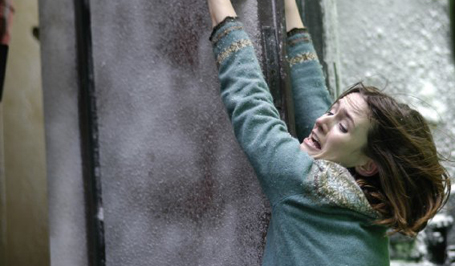
R: So I noticed that all the cast is male except for you and Kate Mara. So what was it like being with all that testosterone? Did you stick with Kate most of the time?
EM: Well, Kate was in and out. She was shooting another movie at the time, coming in for a day here and a day there. So I cleaved to her for the few days that she was there. But it’s great being in a film like this. I never have been. You know where you’re hanging off the back of a train, or you’re in corridors with men chasing you, and running across snow-filled fields in minus-30 temperatures, and everyone thinks you’re frightfully brave, especially if you’re the girl. You get given lots of sympathy… (Laughs) …and, um, you’re told over and over again what a heroic job you’re doing. And I did want them to think that I was up for it. And I was up for it! But I don’t exactly have the physique for an action heroine, and I was…I’m ridiculous when I run. I think Brad (Anderson, director) had to actually cut around the scene where I’m running. He kept saying, “You just look so stupid running!” And, indeed, my friends sometimes make me run for the bus just to give themselves a cheap laugh, because I don’t seem to have mastered the art of looking cool while running. So I was up for it, but I wasn’t always completely convincing. A lot of good editing had to be done to make me seem vaguely action heroine-esque. And the funny thing was we had these terrible feet, these sort of “fake feet” over our real feet, to protect us I guess from the ice and snow and sharp edges from the train. And these things are so depressing. You can’t imagine anything more grim than plastic feet. But they’re about three times the size of your own feet. And then they put sort of red nail polish on them to look more feminine. And they are just the least sexy thing you’ve ever seen. I just kept looking down at my feet and getting so depressed. And in the end, Woody and I took these things off, and it was more out of vanity. We didn’t want people looking at these horrible feet and thinking that they might be ours. So we ended up being even braver than we were supposed to be, but purely out of vanity. But we got whiskey and hot towels for our feet, and lots of sympathy!
BE: Well, no wonder then that you looked so strange running, with your big fake feet.
EM: Yeah! The giant feet make running hard.
BE: Speaking of the setting, was it as cold as it looks on screen? Because it was cold just to watch.
EM: It was minus 30 degrees! It was the coldest I’ve ever been.
BE: How did that impact your performance? Your character specifically is grappling with all of these ambiguous moral issues, and yet you are placed in this stark, white world. It’s all very Russian, really: the freezing weather, the blurry moral lines…the same things that informed the best Russian novels and Russian music.
EM: Mmm hmm. Right.
BE: Can you talk about the impact of the cold, as an actor, in that setting? And can you talk about shooting so many scenes in such close confines on the train? That really seems to add to the menace and the danger. I mean, with those scenes in the sleeping car, you can feel how claustrophobic it must have been.
EM: The cold was very useful in a way. What was great about the way we shot this movie was that we were slumming it in the same way as the characters in the movie. Even though a lot was shot in a studio, the studio could have been a scene in the movie. It was kind of falling down and full of dust, and the people that worked there were kind of these strange Russian guys, you know, with amazing faces. There was nothing chic or glamorous about it at all. And it was very exciting in that way, you felt like you were being let into this world that you’d otherwise never see. And the conditions of it, the fact that we were working very long days and very far from home…everything about the way that this film was made helped inform the feeling of being on this train and being far from home and being in this strange culture.
BE: Right.
EM: But sometimes being in the cold was not helpful. There were instances when it was too cold or not cold enough. One was the scene on that platform, where I’m walking with Kate and telling her about my past, and we were really hamstrung by the cold. And the train time! We had like ten minutes to get it, because the train had to be leaving the station at the same time. And it was the coldest day that we ever had. It was practically impossible to move your mouth or think about what you were saying. And on top of that, you had all the noise from the station – we were shooting at a real station – and so all that in the end had to be dubbed, because you couldn’t get the right shot and have the train and have the noise. And the cold had affected our voices and everything. And then a lot of times I had to act cold when it wasn’t cold. “Remember, it’s cold!” And everything that you touch is made up to look like there’s frost everywhere, but I’m in, like, some t-shirt, and I’ve just been running down the train corridor in some baking hot studio at 10 o’clock at night, and you forget that you’re meant to be cold and that that’s meant to inform the whole way that you play the scene. So it had its advantages in that there was a verisimilitude in it being cold all the time, but it could be technically difficult to deal with. And then, as far as the confines and the small spaces on the train, that was brilliant, too, for helping of getting the feeling of being stuck on the train. Because we were! There were days when the producers were able to hire lengths of track, you know, and we could actually move up and down this track like on a real train. But for most of the time, we are on a standing train, either in a studio or railway station…but they were always the real train. You were never in sort of a mockup of a train. And that was fantastic! You’d have, like, a cameraman on top of you in a bunk bed and a soundman lying under the bed, and just trying to get around each other.
BE: Awesome.
EM: It was great! It was also pretty smelly after a while. It sort of put me off wanting to go on a train for a while, which is something I had rather wanted to do before I did this film.
R: You are working with Sir Ben (Kingsley) again on “Shutter Island,” which is the new Martin Scorsese. Can you tell us anything about it?
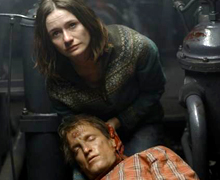 EM: I’m not sure! (Laughs) I’m not sure what I’m allowed to tell you. No one’s told me not to say anything; I just don’t want to be the person that spoils everything. But it’s got a great cast. You probably know that already. It’s got Sir Ben Kingsley, Leonardo DiCaprio, Michelle Williams, Patricia Clarkson, Mark Ruffalo, and all these great people. And I’ve had an amazing time doing it. I’ve gotten a kick just out of being around Martin Scorsese. He’s not in the least bit disappointing. He’s everything you want him to be and more, partly because he’s so chatty. He likes talking. A lot of those people that you’re so impressed by aren’t very good talkers, and you try to have a conversation with them and feel like an idiot because they are shy or something. And he makes talking very easy. And he loves talking about movies and that’s the great thing that one feels from being around him: that his whole inspiration is about the movies that he’s loved and has watched in his life and is obsessed by. And so there’s not very much ego in the way he goes about making a film. He just seems totally thrilled to have the opportunity to make a film when films are what he loves most in the world. That seems to be his attitude, anyway. Whether it really is or not, I don’t know. But I’ve loved being around him. And it’s such an old-fashioned sort of set. It’s just perfectly run, and quiet. And you feel you feel like…I don’t know, that you are working on a film in the 1950s, or ‘30s, something old school and pure class.
EM: I’m not sure! (Laughs) I’m not sure what I’m allowed to tell you. No one’s told me not to say anything; I just don’t want to be the person that spoils everything. But it’s got a great cast. You probably know that already. It’s got Sir Ben Kingsley, Leonardo DiCaprio, Michelle Williams, Patricia Clarkson, Mark Ruffalo, and all these great people. And I’ve had an amazing time doing it. I’ve gotten a kick just out of being around Martin Scorsese. He’s not in the least bit disappointing. He’s everything you want him to be and more, partly because he’s so chatty. He likes talking. A lot of those people that you’re so impressed by aren’t very good talkers, and you try to have a conversation with them and feel like an idiot because they are shy or something. And he makes talking very easy. And he loves talking about movies and that’s the great thing that one feels from being around him: that his whole inspiration is about the movies that he’s loved and has watched in his life and is obsessed by. And so there’s not very much ego in the way he goes about making a film. He just seems totally thrilled to have the opportunity to make a film when films are what he loves most in the world. That seems to be his attitude, anyway. Whether it really is or not, I don’t know. But I’ve loved being around him. And it’s such an old-fashioned sort of set. It’s just perfectly run, and quiet. And you feel you feel like…I don’t know, that you are working on a film in the 1950s, or ‘30s, something old school and pure class.
R: I’m wondering what you thought about playing a female protagonist that really drives the plot. She’s not clinging on to a guy or anything like that.
EM: In a way, the movie drives the plot, after the “incident,” I feel like. After that, I’m sort of running for my life. And the film takes over. But certainly up until that point, yeah, it was great to be driving the story, and have the story be told from the point of view of someone who is not a solid person, has not got a fixed point, and is confused about who she is, and is more than one thing. And I think people in life are often more than one thing, and often opposite things at once. And it’s entirely possible and very usual that you know people who are decent, kind, loving, caring people who can also be selfish, and have a drive and a need for danger and excitement. And they sort of seem like opposite characteristics but they’re very often found in the same person. I think films often simplify people, and make them less than the sum of their parts, and aren’t brave enough to fess up to the fact that people are baffling. I love the fact that the plot is not only driven by a woman, but that this woman is a baffling one.
R: What are some characteristics that you don’t have that your character Jessie does?
EM: What I drew on in trying to understand this character was this feeling of trying to be a certain way, trying to be a good girl and having doubts that you might not be good. And I relate to that. I think all of us have those two sides to us. It’s so funny, the film “Match Point” that I was in, which is so different than this film in so many ways as a genre, but in some ways they are very similar. They both follow a protagonist who commits a crime and gets away with it. And it’s all about an investigation into whether that’s possible, mentally. It’s very Dostoyevsky in a way. To kind of get away with something like that. And I think that the reason that “Match Point” was a success, and that people responded to it, was because people somehow related to that central character. And they felt even though he was a bizarre guy, and they couldn’t totally sympathize, you were in some ways rooting for him. And I think that it was because that that guy, in his journey, was all about, on the one hand, he had a pull toward making a nice life for himself, and it being easy and safe and financially secure and surrounded by people that think he’s great and people that he can love even. And then on the other side he wants danger and excitement and to live life like it’s some sort of adventure and to really go the edge and experience passion and love and lust. And I think that that’s where the confusion of life very often resides for everybody: those two things. You want security and safety and home and hearth, and yet at the same time there’s something in all of us that wants the opposite of that. So I think that’s easy to relate to, and I hope that’s easy to relate to as an audience member. Though, you know, going to the extreme of bashing someone over the head ‘til they’re dead… (Laughs) …is not something that we all probably feel we could do. But my dad…am I talking too much? (Laughs) He was a criminal defense lawyer for much of his life and he defended murderers a lot. And he said that murderers were by far the nicest criminals he’s ever had to defend. And they’d inevitably gotten rid of the one person on earth that was really bugging them. So he’s always kept me very open-minded about murderers. (Laughs)
You can follow us on Twitter and Facebook for content updates. Also, sign up for our email list for weekly updates and check us out on Google+ as well.
